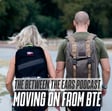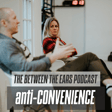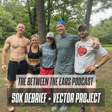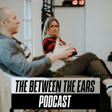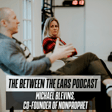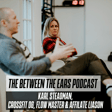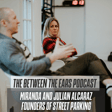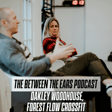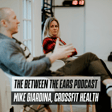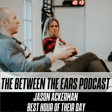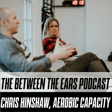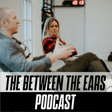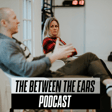Introduction to Spencer Nix
00:00:00
Speaker
Welcome to the Between the Air's podcast. This week we have Spencer Nix on the show. Spencer is the owner and chief researcher at Behavior and Performance Research out of Dallas, Texas. As a performance coach, he has over 20 years of experience working with professional athletes, executives, and everyday clients.
00:00:20
Speaker
He has lectured and coached throughout North and South America. And as a behavior specialist, he holds a master's degree in neuroscience and applied cognition, as well as being a candidate for his doctor of psychology, PsyD. Spencer was actually one of my level one instructors when I took my level one in 2010. And it was just a really awesome full circle kind of connection conversation.
00:00:48
Speaker
to have, to sit down and have with Spencer. We talk about his journey as a CrossFit owner, operator, coaching behavior versus coaching equipment or movements and finding fitness through failure in a pretty powerful and vulnerable and honest way. And it's an honor to chat with Spencer. Lots of wisdom packed into this. I think you're going to enjoy. So without further ado, here's the show.
Creativity in Fitness: Beyond the Physical
00:01:49
Speaker
Hello. Hello. Hello. We have a thing. We always start with just like, hello, hello. And then the guests sometimes there's like. But they usually get it.
00:02:06
Speaker
I usually get it, but it's always an interesting thing is each time is going to be different, which is cool. I think we nailed it. I think so. We messed it up. We told him that too. Like Jason, the first guest to mess it up. Spencer, Spencer, next. What's up, man? Welcome. Good to see you. Great to see you guys. Thank you so much. Um, I've been looking forward to this and happy to be here. Yeah, for sure. What, um, what have you been looking forward to about it?
00:02:39
Speaker
Well, for a long time, I told myself a story that I was the only one that felt like a gym or a fitness center should somehow incorporate psychology and biology. And then I come across
00:02:56
Speaker
or reconnect to a large extent with you guys. And I was just so thrilled to see what you guys were doing and the way that you were saying it. And yeah, just to, I'm at a place in my life where I feel like I'm not trying to be competitive, but I'm trying to be creative. And so to see what you guys are doing and just to have an open conversation is something that, yeah, it's just really appealing to me.
00:03:27
Speaker
Yeah, it's cool to have that. I personally find it very, I guess, inspiring, but empowering, maybe, of not having it be necessarily competition, but to your point, this creativity, this formal or informal collaboration.
00:03:50
Speaker
this very mutual, like, Oh, cool. Like we like, see what Spencer's doing down there. That's really awesome. You know, some different people doing some different things and just kind of having this feeding itself type of thing. And we talked about it a little bit when we talked about it last, but like to buttress against maybe the isolation that comes with being in the fitness industry.
From Competition to Collaboration
00:04:13
Speaker
Yeah. And I think for, I don't know how it is up in New Jersey, but here for many years, my mentality was, and I'm not saying that this is a good thing, but it was competitive even as a business owner. And, you know, I didn't want to see other people succeed. And I thought they had to lose for me to win. And, you know, as I,
00:04:43
Speaker
done this for longer and longer, I realize that's not true. And especially as we're proceeding in the direction that we are, it feels a lot healthier of a journey because of that. You know, like we were talking before we started recording to see your website and to see how awesome it is.
00:05:06
Speaker
I think the Spencer 15 years ago would be wildly jealous of it, but now it's like, Oh man, that's so great. Like I love the way that they put that together. And like you said, it just, it sparks this, uh, inspiration and, and further, um, courage, I think to be, to be bold and, and to, to try to make these connections in ways that
00:05:32
Speaker
that I think a few years ago was almost like a taboo to talk about. Yeah. I love that. That's great also that you're just honest about that because I think that's very common, but most people don't
00:05:46
Speaker
like, no, no, no, I would never feel like that. But it is cool. And we shared this last time, you know, your social media, every time I see it, there is that like, that's so awesome. And then, you know, I think naturally it sparks like a desire for yourself then to be like, okay, how can I be inspired by this or not for certainly not like steal it, but like,
00:06:12
Speaker
have that you're open to a different way of presenting maybe what you're doing and then you see it presented a different way like oh yeah that's that's another way to go and I think all that stuff is just a positive yeah yeah I feel like there's the metaphors and stuff like that we talked about but
Changing Fitness Industry Perceptions
00:06:37
Speaker
It's like there's plenty of fire hydrants and you don't have to piss on all of them. It's like, yeah, that's good. You know, like there's so many fire hydrants and you know, but anyway, um,
00:06:51
Speaker
Yeah, I do think what's interesting and strange and sometimes frustrating about the fitness industry we were talking about the other day, and maybe it's changing with people like you and us, but sometimes fitness is just like, well, it's just fitness. You're a fitness place, they're a fitness place. It's like, oh, you want to
00:07:13
Speaker
whatever is happening inside those walls just gets kind of lumped into this one category. And I think sometimes that can be frustrating because you're trying to set yourself apart or say, hey, this is why we're different, not maybe better just to get the right people and to get that word out there. And often you get just kind of labeled as like, well, it's just fitness. And that can be tough to create that distinction, I think. But perhaps that's
00:07:43
Speaker
I don't know. Maybe it's, we're getting there. So not, not even just tough. I find it, uh, one of the most frustrating things ever because, and you know, I don't know your story completely Bill. I mean, we, we talked just a little bit, but at least for me, I feel like everything that I've, um, worked through cognitively has come from
00:08:12
Speaker
my association with fitness. And so to me, like I hold the gym as like this really sacred place that's capable of doing so much. And so when someone does, like you just said, like reduce it down to something so superficial,
00:08:32
Speaker
And so, you know, you could say like narcissistic or, you know, like so surface level. Um, you know, it's, it's hard for me not to be, I mean, that's, that's like the, the battle I'm, I feel like I'm fighting. It's like, no, no, no, you don't get it. Like you don't understand what this place really is. And, uh, yeah. And I know you guys feel the same way.
00:08:56
Speaker
Yeah, it's not transactional. It doesn't have to be transactional. And there's certainly places that do that, and that's fine. And of course, it comes from a place of you see what it's done for you personally, and you want to, of course, help share that with other people and show them.
00:09:17
Speaker
Look how powerful this can be if you are open to it, but that's also where the road divides, I think. I'm sure you've had plenty of people come through your doors that maybe they don't get it.
00:09:36
Speaker
because I've been doing this for 20 years, that's because I'm at that place. It's what I want to lead with, with everybody. I really was like, man, if I was 22 and a 40-year-old came and was telling me to project ahead with when they die and tell me your
00:09:57
Speaker
narrative, I'd be like, Hey, man, I'm just, I'm just trying to like not be fat. So, so
Fitness as Personal Growth
00:10:04
Speaker
I get it. And I have to remind myself, like, you know, I was there at one point and, um, yeah, I feel like this thing that we're doing is such a, it's, it's anti, it's like anti-sales. It's anti-fitness because nothing here is like a short term solution. Uh,
00:10:26
Speaker
even relationship, right? I mean, it's like I have to, and I know it's the same in therapy as well, it's like I have to earn the right to even have that conversation with you. And then to a large extent, I think that
00:10:41
Speaker
some of those conversations can't happen until, and I'd love to hear your opinion on this. Uh, it's not going to happen while the sun's shining. You know what I mean? Like to use another metaphor. It's like, like somebody's had to experience some darkness or they've at least had to project ahead or, or, or even simulate what that might be like in their life. And then I feel like that's when we can go to that level. Um, I don't know. What do you guys think?
00:11:13
Speaker
I mean, I would agree in that, certainly on the statement of at 22 and 40 and, you know, what are you thinking about? And there's always like phases or seasons of, of life or experience. And, and I don't think we want to admit it as much as it exists, but like timing is a huge factor. And like the timing, the time period in our life that we're in currently,
00:11:42
Speaker
it's almost impossible to like actually supplant yourself in a different time period or environment. Like future, like, I won't know what it's like and hopefully I won't know what it's like for a very long time to get a piece of medical information that suggests, um, coming home soon. Like I hope that's very long from now.
00:12:06
Speaker
And we can cognitively go through these exercises, and they're great to do that. And I think that's memento mori and all of these stoic types of different things. But I also think that the lived reality of each person is that, yeah, where they're at at that point in their life, the timing of whatever the lesson and the nugget might be, it could be so good, but if the timing just isn't the
00:12:34
Speaker
not the right time, but the time that allows that nugget or that seed to really grow, that's just what it is. But the part about the deeperness, the more depth to it, that was something that when I first met Kariana at her gym and crossed it, it was the first time I was part of CrossFit.
00:13:04
Speaker
That's what struck me most was that this wasn't about coming from college athlete, college athletics, and then preparing for the military. There's a very performance driven intent with exercise. I'm training in the off season so that when I put the jersey on, I'll be stronger, faster, better at the sport I'm playing.
00:13:28
Speaker
I'll be able to run faster, hopefully, you know, you know, do more things right in that performance piece. But when I met Kariana, it was like, what really struck me, one of the things was like, Oh wow, this is like, we're doing movements and we're doing workouts here, but there is something so much deeper than six packs and PRs and stuff. And I think being an athlete that was so different because it
00:13:56
Speaker
It was the experience needed to pull me out of that time of train to perform. And it really kind of was this thing of like, now you
00:14:09
Speaker
experience through workout. And that was like, do you think that was, do you think that's CrossFit? Do you think that was CrossFit at the time? Do you think that was like, no, I think it was you. I think it was you because of your and not every coach was like that. There were some coaches that were like, okay, thanks for protecting me and teaching me how to do a deadlift. Like I value that, that for sure.
00:14:32
Speaker
but the individual. I think that's the thing like the uniqueness and what that person also is going through at that time in their life or has been through in their life, their experiences, adding the uniqueness to then how they create, disseminate and involve others in these experiences where it's like just so much deeper. I don't know. Does that make any sense? Was that intentional?
00:15:02
Speaker
Like, was that something that you consciously thought about as you were coaching at that stage? Like, Hey, I want to really, you know, touch these people at a deeper level or, or yeah, we're doing the workout, but we're going to try to incorporate like this little nugget in that way. Or was it just something that was happenstance?
Cognitive Science and Fitness Goals
00:15:20
Speaker
Yeah, I mean, I found CrossFit after being in fitness for however long, 10 years maybe, like traditional personal training, NISM, teaching, spinning, all that kind of stuff. And I think when I found CrossFit, to me, there was this experiential piece, like something different than
00:15:43
Speaker
that. And so, you know, I was at kind of a transformative period of my life, but I think that because that resonated with me, that's kind of what I just carried forward and tried to sprinkle in, you know, and into is kind of an interesting thing because I at the time did
00:16:06
Speaker
I was a regional athlete at the time. There was that competitive piece, but I think that's also why it became unhealthy for me because it was deeper and then there was the competitive piece and I think it was at odds a bit. But for most people, I felt like this is something that's just super powerful for them too. It is the Greg Glassman thing.
00:16:30
Speaker
you know that talk he gave in um at the like affiliate gathering in Montana where he was talking about like get everybody in your gym to put what they want in about in a hat you know i want to be a better father i want to be better my job blah blah blah and then like in six months ask them how it's going
00:16:49
Speaker
Um, so I guess it's kind of that, but just you have to, I think you have to be intentional with that in the culture you create in any gym, CrossFit or not. Um, it doesn't just happen just because you're doing wall balls or, you know, it's not the movements. I agree with that. I agree with that quite a bit.
00:17:15
Speaker
So what, so your gym, tell us a little bit or, you know, this is Spencer. Everybody's 15 minutes. You guys left off, but what the hell?
The Evolution of Coaching
00:17:27
Speaker
What's happening? Who is Spencer? What, what, tell us about your current life predicament. Uh, so much like you guys, um,
00:17:45
Speaker
I started a gym in 2008 here in Dallas. It was called CrossFit Dallas Central. And shortly after, uh, like maybe six or eight months later, I was like, Oh, you know, I really liked the seminar experience. And so I'll do that as well. So almost in conjunction with opening a gym, um, you know, it was a much different process to get on staff at that point.
00:18:15
Speaker
but pretty much started those two journeys at the same time and have had lots of wonderful and really tough experiences as a business owner and as a fitness professional. And then let's call it 2018.
00:18:38
Speaker
had a really hard season where, and kind of to the extent that you guys were talking about, like there just seemed to be a disconnect between what I, what I wanted to do and the impact that I wanted to have. And this model that had been set up, it didn't seem like I could really demand that impact to happen every single time. And in some of those things that I want to say, I don't, um,
00:19:08
Speaker
disagree with, but I just wanted to tease out in greater detail was if, if you get people into a group, like how can you make them a better father? Like what, what are the actual things that you have to do? So it's not just, um, a happy accident. You know, we talk about the black box model and I love that, but I wanted, I wanted just to have, I'm someone that likes systems and I, and I want to know like what
00:19:37
Speaker
what could I really do to influence that? Maybe not control, but influence that better. And so I was a little, I don't know if burnout's the right word, but a little just frustrated with how little influence it felt like I had. You know, 2018, lots of people coming in, but we had no
00:20:00
Speaker
structure around the business as far as, you know, someone could come in and not have a single conversation with someone intentionally from when they started to when they decided that they didn't want to be a member anymore. And so taking that, you know, other things that I'm sure are quite common, you know, like the coaches had no incentive to be professionals because we were paying them by the hour.
00:20:29
Speaker
And they quickly figured out like, okay, I'm going to have to do lots of private training if I'm going to be able to pay my bills. And so there was just a lot of stuff that wasn't great. And then COVID happened. There was a series of things that happened where some of these ideas that I had had about giving everyone a personal coach, but remaining within a group
00:20:55
Speaker
starting to customize a little bit more versus just kind of shout scaling recommendations at the whiteboard. These were things that because of COVID, we were able to basically do whatever the hell we wanted because there was no protocol on what you were supposed to do.
00:21:14
Speaker
And so, uh, you know, we put everyone as there was, you know, shelter in place, we put everyone on a personal training software. And so instead of doing, um, you know, zoom or anything like that, we said, you know what, this is going to be an opportunity to give everyone a taste of what it feels like to have a really bespoke and customized program. And it was manageable because they had little equipment, right? Us, like I'm sure a lot of gyms, we,
00:21:41
Speaker
rented out, not rented, but we basically handed out all of our equipment. We knew that we could handle creating these basically templated programs that felt very personalized for them. Then the great fortune we had is that right when COVID happened, we were moving into a different facility. As they came back to work out in the gym, we kept all of that.
00:22:11
Speaker
And so there were some initial things that, that were kind of just a happy accident that we decided to maintain. And then the ball just kept rolling. You know, every member has their own coach. Um, every person has these required check-ins where they sit down, they have a one-on-one conversation. My background's in cognitive science. And I, when I got into fitness and, you know, fell in love with CrossFit,
00:22:40
Speaker
It was never even a thought that those worlds would combine, but in conjunction with some of the changes from a business standpoint, it just made more and more sense that you couldn't really separate what someone's thoughts and behaviors were from the results from a fitness standpoint. And so much so that I feel like at this point,
00:23:07
Speaker
behavior, thoughts, identity. If you can't start to have some type of conversation around that, then back to that original thesis of how could you influence, like you're really handcuffed to connect with a member on a level that could do exactly what Coach Glassman mentioned. Otherwise, it's just a happy accident.
00:23:36
Speaker
So long story short, we had made all these changes and I was pretty happy with the way that it was going. But this weird thing, and this was probably like the end of 2021, people would come in,
00:23:55
Speaker
And now they had to have a sit down conversation and we just hear what it is they're looking for. And we tell them all these cool things that we were doing, and they would be disappointed at it. They would be put off that we were suggesting something that wasn't CrossFit with whatever traditional CrossFit at this point looked like.
00:24:19
Speaker
And that was challenging because in my mind, it's like, no, no, no, you don't get it. Like it's cross it, but it's, it's all these things because I know what it's like to only do that one thing. And it was just a huge, like disconnect. It was a huge misread. And so a buddy of mine was hearing me complain about this and he said, Hey man, you've changed everything internally.
00:24:45
Speaker
when are you going to change the name? And it just gutted me because I'm loyal to CrossFit. You're talking about Coach Glass and I feel like I owe so much to him. And there's so much just in that journey of almost 15 years where I felt like I was turning my back on not being called that. But the more I thought about it, it did feel like
00:25:12
Speaker
the name was misrepresentative. It's not that CrossFit's bad and what we're doing is good, but just as I mentioned, I wanted something that conveyed more accurately what we were on the path to do. And so, man, we hired like a brand strategist and on the
00:25:32
Speaker
way home from Colorado, my wife and I, we got like a pen and pad and she was writing out hundreds of words like, okay, this is a good word, this is a good word, just like this huge list of words. And we landed on behavior and performance research after a whole lot of dialogue. And I mentioned this to the brand strategist. He's like, that's a terrible name. You can't call it that. He's like,
00:25:57
Speaker
He's like, it sounds like a 70s government institution. I was like, that's perfect. That's what I want. Because I wanted something a little speakeasy. I wanted something a little less sounding like a hard-ass gym. No offense if somebody's listening to this and their gym's called a hard-ass, but something that felt a little bit more
00:26:23
Speaker
Robust felt a little bit more multidimensional. Um, yeah. And so requires a little bit of like inquisition too. It's not like, yeah. Cause it's like, Oh, that's a gym. Okay. That's interesting. Not just maybe like, yeah. Hard ass fitness. You kind of know what you're getting. Yeah. So, I mean, I don't know if that answers the, the question that you were looking for, but that's,
00:26:51
Speaker
That's where we're at right now. And, um, I'm in a weird place from a coaching standpoint because I don't feel like, how should I say this? So much of fitness is mathematical. It's, it's percentages and it's progressions and stepping into this world of coaching behavior.
00:27:18
Speaker
and in coaching identity and coaching mindset, it's such a different skill set. And it feels so much more like being a craftsman and being an artist that for many years I relied on my capacity to memorize stuff and kind of be a showman. And I realized, yeah, right. I mean, you know, you talk about the level one. I mean, it's like, you're this, you know, Broadway actor doing,
00:27:48
Speaker
you know, a thousand shows a year and you know, what is fitness and all this stuff. And it's just, it's so, it has so little to do with being a know it all. And it feels like it has so much more to do with humility and, and not really being attached to an outcome.
00:28:12
Speaker
Because like I said earlier, my desire is like, I just want to fix people, you know, the same way I kind of fixed myself. And you realize like, it's not really, it's not really the game that I'm, that I'm now saying I want to play. And so from a coaching standpoint, I feel even getting on, you know, with lots of honesty with you guys, I was like, man, I don't have, I don't really have much that I need to,
00:28:40
Speaker
show in terms of what I know. I don't really know what I can contribute because that's how I feel at this point as a coach. I'm trying to transition to the level of
00:28:54
Speaker
of kind of being this Jedi where it's not even me doing anything, but it's just kind of sitting back and like asking the right questions. And it's funny because we have this, I now I'm coaching training, whatever the word, it doesn't, it's funny that you say that because it doesn't even, I don't even know what the word is. Like I operate and provide space for people at the gym. You're an operator. That sounds right. I'm an operator.
00:29:24
Speaker
And I'll come home, because we don't... I know one of the posts you put up that was so great was
The Human Element in Coaching
00:29:33
Speaker
about choosing the right movements. When we talked about this, so you're not... If you're coaching a barbell snatch, there's a lot that has to go into that movement so that the person is safe. When you stop coaching such
00:29:50
Speaker
when those high skill, very technical movements maybe aren't part of the everyday, it provides a lot more space to coach the human. And there are days where I'm like, our people will go in, we have like an open policy so they can go in on their own and
00:30:09
Speaker
do their own workouts. I mean, some people will, some won't, but it is much more of a connection situation. Like what, what did I, did I like get them better at fitness today? But is that really the goal? Like that person isn't going and competing in a powerlifting meet in four months and working on like, you know, their deadlift and bringing in the straps and whatnot. So it's, but you know, it's also, um,
00:30:40
Speaker
when you relied on or when that was the being able to run a class and knees out, Spencer, good, get your chest up, up, up, up, and just like, and stand and down. And like, yeah, that was like, that was like regarded as like, yeah, you can queue and code. And that's great for what that is.
00:31:01
Speaker
but it is finding the value again and being like, okay, this is valuable. People are finding value in this. It's not just because they didn't get 10 cues on their squat in that set of 20. That's not what we're doing. That's not when they walk out the door what had them feel like that was a really great experience in our gym. To hear you say that,
00:31:29
Speaker
It makes me think in that previous model, it was so easy to feel successful yourself as a coach. There were things. It's like, man, if I could just nail this, it's a great hour. Now I'm searching for, man, how do I even know I did a good job? That's my own hangups because I want the pat on the head and I want to feel like, man, I did a really good job here. But I think what we're talking about is it's just a different
00:32:00
Speaker
it's a different game. It's one I want to play, but it's just like you said, it's like why, okay, what are they really here for? Maybe it's not even related to, you know, the workout. Right. And I think as coaches, guides, whomever, whatever we're labeling it as,
00:32:24
Speaker
I think we've done our job when the client, the member, whomever can turn to us before, during, after, whatever the session, and with honesty say, I don't need you. We've done our job.
00:32:44
Speaker
But like, but, but I really value this. I want this. I know, like I don't need you anymore. And I think that's when as coaches and guides, we can be like, uh-huh. And that's, I think the Jedi and having like,
00:33:08
Speaker
the performance nature of different models, different types of classes, different experiences, even, you know, those are very much about the coach and a little personal bone I have to pick with that is coaching by definition isn't about the, it's not about the coach. It's not about the guide. It's not about that. It's about the person who they're,
00:33:37
Speaker
coaching, right? And, and I've been there too, where when I first started coaching crossfit classes, it was, I realized too, like, wow, this is, I'm making this all about me. And what's difficult with that is as a former athlete,
00:34:01
Speaker
The coach doesn't go onto the field and play the game for you. There's a hard limit to where the coach can go. You've put a post up that we refer to about movement selection and an elevated view on the movements that we program for people. One of the things we loved so much about that was
Community and Culture in Fitness
00:34:33
Speaker
And what's cool about the collaborative kind of thing of like, you know, rising tides and whatnot is like, we've said to our people or internally for sure to the two of us, like, we're coaching, we're coaching humans. We're, we're coaching humans. We're not coaching body parts. You know, we're, we're not coaching equipment. We're not running, you know, like, like operating a machine, like a crane, like,
00:35:02
Speaker
Okay. If I pull on this, that happens. Like that's just not how it goes. And so for that deeper connection, ask diving into the, uh, what do I do if I don't have to tell someone to get their knees out? It's like, yeah, that's the elevated problem to solve.
00:35:23
Speaker
as a coach who's guiding someone through identity, behavior, life, whatever, you know, whatever it might be. And not to say we don't, like, if someone is squatting, you're not ever going to help them do it correctly. I mean, yeah, of course not. It's like, Spencer's picturing our channel with people just, me is touching, like, we're not going to... No, not at all, not at all. But I mean, you know, it's certainly, I was,
00:35:48
Speaker
one of our coaches at the other, I had a conversation with one of our former coaches and I kind of realized how much, you know, a great example of that is when there's a workout in a CrossFit gym where it's like rowing.
00:36:04
Speaker
just rowing or rowing in pushups. And for me, when we would have those workouts, I loved those because it provided... That was an opportunity. You didn't have to... People weren't bouncing around. They weren't all over the gym. You could really speak to people and layer in some things because you weren't so busy with keeping people safe and making sure they won't kill themselves.
00:36:33
Speaker
But I think a lot of coaches, and I think to go back, not to go back to CrossFit, but even that little piece has, I think, could elevate so many CrossFit gyms if they didn't want to maybe go all the way to where we're all going to just get a little more comfortable with that. Because I think a lot of coaches are uncomfortable with that. They'll just turn up the music or it's kind of like sit in the corner. I don't know. But that's a great opportunity to
00:37:03
Speaker
not maybe connect with people because they're still in the workout, but it's just kind of an interesting thing that there's a reliance on the technical and that that's the mark of coaching. And yeah, we kind of disagree. So. Yeah. Yeah. It's like, what do I do if I'm not able to brief at the whiteboard, call people up and down in a squat or offer correction? And it's great that you say that.
00:37:32
Speaker
you know, because we're not programming high intensity workouts every day, a couple of times a week, it'll be zoned to very, very loose structure. So there's lots of ways to navigate this. And because we're still meeting in group sessions a few times a day, we've talked as a staff like, Hey, this is what, this is what you're going to do at this moment. And it's everyone's favorite,
00:38:02
Speaker
days just because you didn't realize that, Hey, that way to connect with people, that's actually what culture is. Like that's actually what community is like this thing of, Hey, look how great I did queuing everyone up and down. Like that's, that's PE. You know, that's not, that's not creating a culture with adults. Like it's culture is creating these moments where, where people can connect either with you or with each other. And these days that you're describing are,
00:38:31
Speaker
If it's a classic CrossFit workout, it has to happen after the fact. I'm convinced that this thing that we're all holding onto very delicately, this group training in culture and all this stuff, it's because of what happens after the actual workout.
00:38:50
Speaker
It has little to do, uh, in my opinion with, with how great the coach is at coaching. And, and as I hear us talk, maybe, maybe a better words, like what do we call ourselves now? Like maybe it's a Sherpa, right? Cause the Sherpa gets no attention. You know, it's like the other guy going up the mountain and they're just kind of like, you know, you know, doing the heavy lifting form. Yeah. Yeah. And that, and that, and that, I think that is also why,
00:39:20
Speaker
there are CrossFit gyms or CrossFit classes with coaches that aren't technically great and people love that gym. They love their community. And so, you know, it's like, okay, so we can get better technically and sure that's something, but the gym still is thriving and the coach is technically terrible maybe, but like, okay, then it's not just about, there's something a mess there, so.
00:39:48
Speaker
Yeah. Fun fact. And I think it's fun. It's fun. It's fun for me. It's fun for me. You were one of my level one instructors. Yeah. I was telling somebody that, uh, early today, I just decided I was excited to get on here with you guys. And, uh, I only did like a handful of military, uh, seminars. In fact, I didn't get out of Texas very much, but so, so this,
00:40:16
Speaker
you know, the one at Fort Hood is one that sticks out in my mind and it's pretty crazy to... I was the only civilian there outside of the instructors. That was right before I went. Which I felt completely, I felt like I don't belong here. I'm an imposter. I, you know, uh, all of those, all of those human insecurities. And then I also felt like this deeper desire to
00:40:43
Speaker
gain entry into that community, speaking of community and culture. And then moved home and met some blonde. Well, I was thinking like, what could be a good transition? But there's really none. But so I'm just gonna transition us because I'm curious, like one of my
00:41:06
Speaker
We relaunched the podcast a few episodes ago, and it coincided with launching the dose that you've subscribed to. And so we thought it would be really cool with the podcast to have guests do one of the workouts. So far, people have voluntarily, or we've volunteered them to do it, and they haven't fought back. But for sure, and it's always cool to hear people's experience.
00:41:34
Speaker
But in particular, I'm really excited to hear about yours because we share, because you do share this. No stranger to deeper. Yeah, mindset, deeper connection using a workout as a tool. So yeah, so we're curious to, I think for you, for some people, we gave them kind of like, hey, here's the workout. And we kind of offered up to you like pick one, if you've done more than one that you thought was particularly
00:42:05
Speaker
for whatever reason you wanted to share. Um, so yeah, what did you, what do you got?
Insights from Challenging Workouts
00:42:11
Speaker
I've done several, I've done several of them and I don't leave many of these feeling like a super athlete. There's several, it's like, Jesus Christ, that was really hard. That was like me on Tuesday night as well testing next week's.
00:42:34
Speaker
Oh man. Um, my wife and I did the one that you guys put up this week. And, uh, for those that don't know what that is, it's a death by format, which personally is one of my favorites because it means that you will fail at some point. And so it means you have to reconcile the fact that you will not be successful with this workout, even if you've,
00:43:02
Speaker
postulated that to get to a certain round, it means you're a tough guy. At some point, there is this moment. Yeah, there's this moment where you say, I didn't do it. What's tricky, and I'm sure that you guys are the same way, is that I've done so many iterations of this that I self-hearded through most of this workout.
00:43:31
Speaker
thinking that I knew what I was going to experience. And so for those listening or watching that don't know what the workout was, it was a round of Cindy in the first minute, and then transitioned to a concept to bike for the second minute. And you wanted to make the, uh, the bike portion challenging, but doable.
00:43:58
Speaker
in terms of consistency. Did I get that right so far? Perfect. Yep. Do you remember there was a period of time where it was really popular to have like around a Cindy and then do a minute on the bike. It wasn't death by, but it was like basically an Amrite back and forth. Uh, so I, I had done several versions of that a few years ago, so I kinda knew what I should be doing on the rower.
00:44:27
Speaker
And I thought, well, if I can do that on the rower, I can sure as hell do it on the concept team fight. And only one round of Cindy. Right. But I thought, you know, okay, 40 seconds for a round of Cindy, all good. To carry this forward, the format that you guys came up with, as you go back to Cindy, it's an additional minute. And I want some clarification. My wife and I,
00:44:55
Speaker
We didn't start the second round of Cindy until the clock beat. I don't know if that was right or wrong, but that's, that's how we interpreted it. So we did a round, waited the remaining part of the minute, did a second round. And that's how we kept going. Was that the way that you guys, interesting. So this is, and I'll be quick with this. That's it's accurate because you did it with intention, like,
00:45:23
Speaker
And you had a thought and it was like, Hey, this is what we're going to do. When I did it, it was, I was thinking, um,
00:45:31
Speaker
not to interrupt it. So like, gotcha. Two minutes. Yeah. So if I, if you did 40 seconds, you finished your 15th squad at 41, you know, you're walking back to the pull up bar, but not a wrong way by any means. But the way you did it, I think I liked it more challenge. I really liked that. It's like, it's like Mary, isn't it? Mary is Mary. Um, the 30 minute email, Cindy,
00:45:58
Speaker
It's the one where it's 30 minutes of every minute on the minute and you start out and you're like, yeah, this is like seven minutes in. I liked the way you did it. But that is tough because you're, you're never buying time. You're never gaining that extra bit. So I, you know, I did 20 cows on the bike and I did strict pull ups and I pooped out right at the beginning of six and I saw your score bill and I thought,
00:46:28
Speaker
I mean, that was also challenging. So it's like, man, I, I really want to try to get to, I don't know why I said this, but I was like, yeah, it'd be really cool to get to where Bill got. Um, but at that point, it was like, it was really hard. It was really hard. And, you know, to make matters worse, my wife is.
00:46:49
Speaker
like five, two, and has really short limbs. And so we were facing each other this whole time. And she was doing like two, three squats for my one. And so this whole scenario, except for the bike, because I'm a lot heavier than her, that was the only time I felt like, what's that? I hope she didn't do 20 calories on the bike. No, she did 12.
00:47:17
Speaker
Okay. Good. I'm like, that would be terrible. She did too. And I think she, I mean, I think she nailed it. She got all the way through the six rounds and back on the bike and almost finished that. She, she's a better athlete than I am. So I had all these, I had all these, you know, great inputs that were, that were really challenging to find some way that I could.
00:47:45
Speaker
be proud of what I did or the directed that you guys gave to just, what were the words that you had? Stay with it. Yeah, to stay with it. That was my mantra. But the mantra knowing full well that there was going to be some point where I couldn't stay with it. Yes.
00:48:07
Speaker
So I thought it was awesome. I'm full disclosure, really sore. We did it a couple of days ago and you know, some of the, the thoughts, the, the hot wash, the after action report is how, you know, at this stage, I need to stop looking back and trying to have some frame of reference for what
00:48:36
Speaker
I judge is a good performance to just have these workouts where it's like, Hey, let me, let me just be really present in the moment to not have these expectations of, you know, cause some of that stuff I was talking about, that was like eight years ago, right? I'm a completely different human. I'm a completely different athlete. Like, like honestly,
00:49:02
Speaker
me comparing myself to that would be like me comparing myself to, you know, one of you, it's like, it's not really, it's not really the same. So that was a thought that I had how when you've been doing something for so long, it's easy to immediately like, you know, reach in the cookie jar of past experiences and try to,
00:49:24
Speaker
project what you're going to experience versus almost treating this with like a new set of eyes and a new set of, you know, limbs as you're, as you're going through
Personal Growth through Fitness
00:49:36
Speaker
this. And, and that was, I think the biggest like revelation not to go off on a weird tangent. Um, but you know, we talked about my wife and just being married. I feel like we're in a place where
00:49:54
Speaker
we're both evolving. And so it's the same person, but I need like a new set of eyes to see like who she is. And, and I feel like there's, there's some similarities to exercise, like, like these workouts that you guys are prescribing, they're so good. And most of them, um, I've told myself this really boring narrative that I've, I've experienced every combination of functional fitness that you can,
00:50:21
Speaker
produce. And it turns out like that's, that's not true. Or even if it is true, that story isn't doing me any favors. You know what I mean? Like I can tell that that story that I'm telling myself that I'm kind of this salty veteran of programming, it's, it's doing me no service at all. And some of these workouts has just been a great kick in the pants to be like, you know what,
00:50:49
Speaker
you need to have a new set of eyes for some of these things that you think you're so familiar with. And you have to realize that the person that you are today is not the person that was doing CrossFit 15 years ago. Yeah. That sounds, when you just shared that, that sounds to me like it come out of your mouth, speaking to your members verbatim, maybe not CrossFit 15 years ago, but like,
00:51:18
Speaker
who you are today, who you are right now is what we're focusing on, who you are right now en route to becoming who you want to be, but let's not let who you were control who you are right now.
00:51:39
Speaker
behavior change, identity change, all of the research and development going down at your gym. It's like an incubator for behavior and identity change.
00:51:55
Speaker
in a culture and an environment that supports that type of growth on purpose, not just the happy accidents, not just the, you know, daisy grown between the cracks in the sidewalk. Not that there's anything wrong with that. It's a beautiful notion to potential and resiliency, but like, oh, the actual environment that you and your wife and your team are creating down at your gym supports the kind of growth to
00:52:26
Speaker
to behavior and to identity and to an expansive experience of self. And when you say that in relation to the salty veteran who's done every combination of Cindy and Murph and Barbara and Mary and like all of the things, right? Like push up a squat, how many multiples of that can we do? And to have the realization and the connection point be like,
00:52:56
Speaker
the, the value to almost receive the receive what it is that you're creating and dosing others with, which is evolution for evolving self. Oh, that's wonderful. Yeah. Uh, can be being a business owner can be a very lonely road and you, you put so much,
00:53:26
Speaker
focus on others. Uh, that's the thing I wish I could go back and tell myself like, Hey, this thing you're getting into, it's worth it, but it's going to be a lot different than you think it is. It's going to be a lot less about what you're going to get out of it. And I think just to hear that from you is, is great. And it feels, it feels good to get some, to get some, some coaching sent, sent my way. So thank you for that. Yeah. Yeah.
00:53:55
Speaker
And I think we've, we, I will one. So does your wife coach as well? I feel a little bit bad. She's not on here. She's just, uh, that, that would have been cool. Maybe another time. Now she's, uh, our kids are in a really cool, our kids are pretty young. They're nine, uh, six and four and two of them are in a hybrid school or a couple of days a week. They're on campus and then a couple of days a week they're at home.
00:54:26
Speaker
Um, so Kelly, my wife is the, uh, the co-teacher, you know, on those days. Um, so she's been, she's been a mom and focused on that, uh, but did coach a little bit before we had kids. Yeah. Yeah. Um, I wanted to ask, how did you get into fitness and fitness as a profession? I don't think the, Oh man.
00:54:53
Speaker
Um, so I was not a great athlete growing up. I feel like sometimes there's a misconception that people are, uh, in the fitness industry because they've just, you know, they've had just all this excess potential just bleeding out and they want to share it with others. Um, but I had some really.
00:55:18
Speaker
challenging experiences growing up. I have lots of family that was in the Navy. Towards the end of high school, I was like, hey, I want to go to the Naval Academy. I was a good student, didn't play any sports, grew up with some pretty bad allergies and asthma. You have to take
00:55:47
Speaker
aptitude test, a physical aptitude test for the academy, um, I failed it. So I got a congressional appointment if you're familiar with that process and I had the grades and I had the ACT scores, but I didn't get in and a lot of it was because of the, just like having never done any of that stuff. And so that was a huge, um,
00:56:14
Speaker
blow. I mean, that was, I was already an insecure kid. And so to have that was really, was really tough. Down here in Texas, there's a school called, you know, A&M, which is pretty well known, but they have a, an ROTC program. And so I entered that just because I was like, okay, I'll go here for a year. And then, you know, there's like kind of this back door where you can get into the academy. And so that was my plan.
00:56:44
Speaker
But when I got down to A&M in the core, as it's called, you go on runs every morning.
00:56:55
Speaker
And I instantly like couldn't keep up. It's a formation run. I mean, you know, they're, they're, they're pretending to be in the military. So a lot of the things, you know, you would assume are, are kind of like they are in the, you know, the army or, you know, the, the real military. Um, and so I was put in this, uh, remedial PT program with basically a bunch of fat kids and me, and I was in there for an entire year.
00:57:24
Speaker
And so you have these two experiences where it was like, Hey, I've got to figure this out. Like this fitness thing that I didn't think was important. It turns out like it's, it's, it's making my life like a living hell. It's making my life miserable. And so, um, you know, I started to investigate like, what are some things that I could do and what are some things that I could control?
00:57:53
Speaker
And, you know, at first it was something that was just, how can I get out of this group of fat kids, you know, to, to be really blunt. And then, you know, you start to figure out like, and also I was a late bloomer, you know, so I, I was, when I graduate high school, really skinny, same height, I'm six to, but I was 160 pounds.
00:58:20
Speaker
I mean, that's pretty, you know, that's pretty thin. And so, you know, as I was learning this stuff, my body also was, you know, developmentally changing, which, which was lucky. And so, you know, long story short, it was something that went from a huge insecurity to something that I felt like, okay, I can finally get out of this, you know, group. And then over several years, it was something that
00:58:50
Speaker
just turned into like a full blown passion and, you know, almost an obsession, probably not necessarily in a really healthy way to start.
Kariana's Fitness Journey
00:59:02
Speaker
And then, you know, a few things happened where I also started personal training from A&M went to work in the sport performance and did that for a couple of years.
00:59:19
Speaker
And that's when my brother and I first found CrossFit. And yeah, just shortly after that, I came back to Dallas to get my master's in neuroscience. And that's when my brother and I and another friend opened up the gym in 2008. So for the first couple of years, I was in grad school and I was doing that at the same time.
00:59:46
Speaker
And then, you know, just as CrossFit developed, like that took all of my attention and focus. And yeah, that's kind of, I'm trying to think if I left anything out. I mean, I think that's kind of the main bullet points there. It's funny because
01:00:07
Speaker
Bill and I have very different fitness stories, or I don't really know, you came to fitness because of me. But I said, you really came to fitness because of me. You didn't open a gym, or your fitness has been for a purpose. My story is actually very similar to your Spencer. I did ski team, I did
01:00:33
Speaker
tennis, like it was not an athlete. And it is funny because people always assume like, Oh, you know, you're an athlete, it's sports you play. It's like, I didn't, I would never call myself an athlete. You know, gymnastics at an early age, but never had
01:00:52
Speaker
even, I guess, for me, that commitment or that discipline, when I see even our kids practice, that's totally foreign to me. I didn't even had no interest in that. Then I went abroad for a year. I deferred my admission to school and went to Norway, which is where I have citizenship and family and wanted to do that. Basically, it was a year of, I wouldn't say debauchery, but
01:01:20
Speaker
quite a bit of going out, not eating healthy. So came back, had gained some weight, did not do any fitness. I mean, walking to the bus to go out was the most fitness we did. But then when I came back, a friend asked me if I want to start going to the gym. And the process for me was that personal
01:01:50
Speaker
Yeah, like growth, like, wow, this is, I can like impact a change. I can make a change. And I just remember seeing when I first saw like a visual aesthetic result and it was like, wow, like this is working.
01:02:05
Speaker
And then I went on to get a job at University of Maryland in the rec department, and kind of the same. I went, of course, totally overboard, and it became completely obsessive. And then you find your balance out, but not the athlete thing. While now, I do identify with some of those traits of, I guess, an athlete. I kind of feel like an imposter because I wasn't
01:02:34
Speaker
I was never officially an athlete. But I think that is probably why there's something deeper. For Bill, his experience is this is for a purpose. This has got a function and a job. And for me, it was just like, yeah, this was personally super rewarding. And that's more common for most people, what they're going to find from fitness, not the performance piece.
01:03:02
Speaker
Yeah, the interesting part of, and I bet you have some similarities as well, but initially it was kind of what we were saying at the very beginning of our conversation. It was these things that I was really insecure about on the outside. But then through CrossFit, I think as a lot of people achieve after a certain point, it's like, hey, I was in really good shape. Like I got to a point where it's like, hey, I don't look like a punk anymore.
01:03:30
Speaker
but I still, I realized that it didn't make me happy. Like, and I think that was kind of this crossroads at, you know, 2014 to 2018. It's like, Hey, this thing that you kind of put on this pedestal that if you could finally get it, it would solve all your problems. It didn't do Jack shit. And, and even arriving there, it was a huge letdown. Like it was, it was,
01:03:59
Speaker
just a huge existential crisis, like, okay, what's, what's the point here? And, and what I determined is that I was still the really insecure 16 year old. And I like to joke that my pre-workout for, you know, 15 years was imposter syndromes, right? Like that's, that's the thing that fueled me to do all this stuff. And it was not until I could come up with a different reason for exercise,
01:04:28
Speaker
that it wasn't because I was insecure, but actually I've fallen in love with this. And when I do it, it makes me feel better and I can be a better dad and I can be a better father. Um, but that took a lot of, that took a lot of counseling and a lot of, a lot of journaling and a lot of, um, just, just introspection to arrive at that point that even, and it's kind of what we were talking about,
Existential Reflections on Fitness
01:04:54
Speaker
right? Like, even though we had done all the stuff that we were supposed to do.
01:04:59
Speaker
It was just so myopic. It was so short sighted of what fitness was really supposed to be like. Do you mind me asking, what did you put on the pedestal that was supposed to be the, you know, the savior? I think for so many years I had, I had told myself,
01:05:30
Speaker
that I was too sensitive, too skinny, not masculine enough, hadn't had experiences that would let me know that I had what it took. Really, it came down to not feeling good enough. And I thought that if I could get to a point where
01:05:54
Speaker
statistically speaking, that physically I was good enough, that that would mean that I was good enough on the inside. Yeah. Yeah. Thanks for sharing that. I think that's really powerful to hear. And I think it's also speaks to this deeper, it's like an archetypal archetypal.
01:06:23
Speaker
I don't know what the right word is. It's an archetype that men typically experience more of that proving oneself in different regards. This question of, will I be enough to perform when asked to do so?
01:06:51
Speaker
and to have experiences that ask that or don't. But when so much, like for me, some of the stuff that I've struggled with is in the military, I feel unsatisfied with my experiences because they didn't answer that question in the way that I wanted to answer it before going in. And it's like, regardless of if I was really good at my job and got good results and blah, blah, blah, and anything like that, it's like,
01:07:21
Speaker
you know, there's this, there's this overemphasis on something that doesn't actually emphasize who you are. This, this, this litmus test, this criteria, I think males have, and you know, different have different people of different kinds, but it's really refreshing to hear somebody go through that and share it.
01:07:49
Speaker
for other people also to hear it and see like, yeah, am I continuing to pour like water into this cup that's got a hole in the bottom? And because it is the deeper thing. And to hear both of you like share that finding fitness and getting attached to it and immersed in it from a place of, you know,
01:08:19
Speaker
personal passion first, not, you know, uh, kind of logical purpose in the sense that this is for that, like, yes, this is to get out of the group or this is to reclaim my health or something, but like hitting so deeper, hitting that center that we call it, like, you know, which is referred like the who or the self, like hitting that essence of who you are.
01:08:50
Speaker
And fitness was just the, the, the access road to that. It wasn't the destination for it to be. And I think that like, it's just really cool to kind of, I think it's really cool to hear that. Thanks for sharing. Yeah. Um, I got to hang out with.
01:09:09
Speaker
We were in Colorado early this year and we went skiing with, uh, the chance Matt and Shuri, which you guys know. Yeah. And Matt and I had, um, a great conversation where we connected on that same point where it's great to, I think just get older and it's great to, to arrive at a point where it's like.
01:09:33
Speaker
part of my friends was like, who the fuck cares? You know, all these things that you think you need to do to prove yourself. You realize like no one was telling you that you had to do that. Like you may have had some experiences where it felt like you weren't enough, but then you get to a certain point where
01:09:56
Speaker
you know, now it's like, hey, I'm, you know, it's because I live with four girls. But at this point, it's like, you know, I'm really thankful that I'm sensitive. And I have that side, you know, because for years, like I just wanted to suppress that. And it meant that I was, you know, more feminine than I was masculine, or, you know, all these things that
01:10:18
Speaker
you know, these little micro traumas that, you know, I just kind of suppress or others like, Hey, you know, it's just kind of like party who I am. And, um, I know I'm tough, you know, in certain ways, but you know, not the toughest person ever. And it's like, God, just who the fuck cares? Uh, pardon, pardon the language, but I love it. Just to kind of cut yourself some, some slack, um, and, and find it, you know, and I think what's great is like,
01:10:47
Speaker
We didn't abandon fitness when we realized like, Hey, that purpose for it wasn't serving us very well, but we were able to kind of reappropriate and remix and, and, and go just a little bit deeper versus I think several people just kind of sluff it off as like, okay, if I, if I don't want to be narcissistic with this anymore, then I just can't do it. And I think what, what I see with you guys and what's a wonderful thing to share in is just, uh,
01:11:15
Speaker
there can be so much more, right? It's so much more significant than the stuff that we, you know, sounds like both of us kind of initially gravitated towards. Very cool. Oh my God, I can't believe I'm blanking out now. I was going to ask you a question.
Pivotal Life Decisions
01:11:39
Speaker
Oh, oh, oh, yeah. So whatever happened to the ROTC thing?
01:11:45
Speaker
Man, um, A&M is, I don't, I don't know how, you know, I'm so close to it that I assume like, Oh, everybody, everyone knows about A&M and knows about the core. Um, you can, you can go through that full program. And after two years, you know, everyone's there on scholarship for the first couple of years, but after a couple of years, you can decide if you'll take a contract or
01:12:12
Speaker
Um, go what's called DNC, which means drill and ceremony, which means you literally wear the uniform, but you, you do all the shitty stuff, but you don't go into the military afterwards. Right. And you know, some of the experiences that I described to you guys were part and parcel with why I decided not to, but, um, yeah, just didn't feel like the right decision. And it's one that.
01:12:42
Speaker
that I, I, I don't regret. Like I love everything that's in the military, but I think those experiences thought, you know, okay, this is, I thought it was this and now with more detail and more clarity. Um, yeah, it just was very, very clear and evident that that wasn't my, my path. Yeah. Wow. Yeah. That's cool. What's it like to say that?
01:13:10
Speaker
to like, I'm sure you've, I'm sure you, this isn't the first time you said it, but like, you know, on a podcast, like for you to hear yourself, I'm curious for you to hear yourself now saying that. What's it like? It totally feels authentic. It feels like, as I look at what I was able to experience, man,
01:13:35
Speaker
all the wonderful things that are in my life would be totally different if I had gone down that road. And so, you know, how I met my wife, how I got into CrossFit, all these things, you know, that I love and appreciate in my life. And I'm so thankful for, I'm sure something else would, I would, I would spin it that if I did go in there and I'd say, Hey, that was awesome too. Um, but I like to, I like to look back with great,
01:14:06
Speaker
um, reverence and say, man, that was exactly how it was supposed to go. So by saying that out loud, it feels like exactly what, um, you know, my, my journey was supposed to be. Nice. That's cool. Yeah, that's beautiful. Yeah. I love that because there's this like coherency with one's autobiography. That's like a very good indicator of psychological health and mental fitness, emotional fitness, however you want to say, and,
01:14:36
Speaker
Yeah. To have it be part of a coherent story with, this is where I was to the timing bit and this is what it was, this is what it wasn't, this is what I struggled with, this is what I was thinking, and then that morphed into this thing as opposed to reading the book and then just hard next chapter, no coherency, no overlap.
01:15:01
Speaker
the lack of smoothness from one chapter to the other or the lack of the coherent story is usually in those pauses or in those breaks in the autobiography, it's almost like, hey, that's maybe where we should do some work because we want to live this coherent, smooth thing.
01:15:23
Speaker
I just also like with what you're doing with the behavior, uh, you know, the behavior coaching too, it's, and some of the exercises that you lead your clients through. It's, it's like a cool, it's just a cool thing to share of like having the leader of your community, you know,
01:15:44
Speaker
living it as well. And that's always so powerful and no textbook's going to teach that. No performance is going to validate that, but to have you leading it and leading your people through it is really cool. And so it's like, so what do you have to do to get better as a coach or what do you do for these people? It's like, well, you just, you just be you and that's good. Yeah. Yeah. Um, you know, once again with the behavior coaching, it's like,
01:16:09
Speaker
the reason we're doing this is because I've been the recipient of more of that than anyone in this entire facility. If we're a dumb analogy, if we're like a transplant institute, it's like I've received the most transplants here and that's why I'm in charge. But when we rebranded, I was really
01:16:34
Speaker
nervous and self-conscious that there were going to be riots in the streets, that our members would be so outraged that we changed the name. And so we had everybody over to our house and just kind of had like a little celebration. And I shared that story that I shared with you guys and shared the second part. It's like, hey, just getting fit didn't really give me any type of self-actualization.
01:17:04
Speaker
It was a really wonderful and special moment to share that. Cause I could tell that one, that was a shock to them because I had never really been open like that. Um, maybe because I was a little reluctant, maybe there's, you know, what's the great pulpit to have that conversation.
Vulnerability and Leadership
01:17:27
Speaker
Um, but since then it's been, uh, you know, what are they, this may not be the right
01:17:34
Speaker
term, but I've heard it called like the Johari window that when you share something about yourself, like it inclines people to share things about themselves. But from that conversation, it's kind of like open the door for it to be okay, to not be a tough guy, to not be as fit as possible while you're in here, you know, to have some hang ups, to not be a finished product. And all these things that
01:18:03
Speaker
has been like a really good thing. So yeah, it's like having the, the vulnerability to share, um, I think has been something that is transforming our, our business as well versus, you know, just trying to back to the hard ass fitness, you know, like trying to just project, you know, how tough you are. Yeah.
01:18:27
Speaker
Yeah. Beautiful. Well, thank you for sharing, man. This was awesome. This was great. This is what we mean by it's tough to like in hours, like, wow, an hour. But I guess that's what they say. That's what it is. That's what we're doing. Yeah. We'll have to have a part two. That's all that means. Yeah. Amy, Kelly, Kelly, sorry. Bill is terrible with names. Yeah. That's why when I first learned her name, it was like Spencer here. Yeah.
01:18:57
Speaker
When I first met Coriata, it was like, that's K, just the letter. My father was appalled at the fact that my beautiful Norwegian name was reduced to K, but that's okay. You do know my name now. I do. Somehow you made it through that trial. Yeah. It's propping up our bookcase.
01:19:25
Speaker
The field manual, very cool. Very, very cool. I wanted to put this out there and talk about it because people listening might be like, well, I don't live in Dallas. And it's like, right. And you can get a taste for Spencer's prescription. I suppose what, what you have in the lab through the field manual, which is really cool. We really love it. Um,
01:19:53
Speaker
Check it out. It's on Amazon. I went to school for graphic design, not fitness. Oh, you did? Bill, you're lucky to have her as a business partner. Without a doubt. In many ways. Thank you. That means a lot. We love it. It's really awesome. It hits so many cool things. Buy this thing, support Spencer. He's a real human. You did this all yourself, right?
01:20:22
Speaker
Well, yeah, it was kind of in conjunction with the launch party. I just thought it would be really cool to have like a manifesto to explain why we were going in this direction. So yeah, it was really just an internal thing, but I've had friends like you guys that have
01:20:40
Speaker
just based on curiosity, you wanted to see it. So yeah, it's cool that you guys have that means a lot. Yeah, it's awesome. Um, you want to do the like, where can people find you thing?
01:20:54
Speaker
Spencer Nix got in early on Instagram. So it's just my name, N-I-X. The gym is where I'm putting most of the consistency with, and that's bpr.institute. And yeah, if you follow, I'll see it. If you leave a comment, I'll respond.
01:21:21
Speaker
and it'd be cool just to, honestly, it would be cool to connect with anybody that's, I feel like we've planted this flag and we're trying to gather people around it. So I would be super interested just to connect with other fitness professionals or individuals that kind of feel a little disenchanted by
01:21:41
Speaker
Um, you know, maybe the 2000s model of fitness and is looking for something more. So that'd be super cool. Yeah. There's a few people I know that come to mind that I'm fairly certain they'll gather around the flagpole. Yeah, they'll gather, but Spencer really appreciate it, man. Thank you. Thank you guys so much. Open, so honest and continuing to provide value, man. Thank you guys. What an honor to be here with you. Appreciate it.

